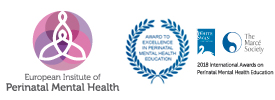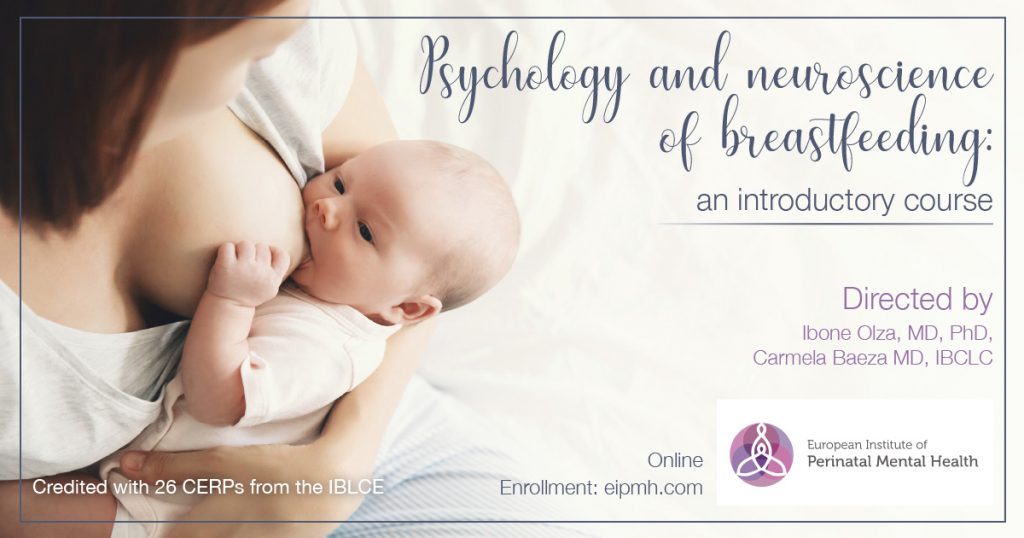Psychology and neuroscience of breastfeeding:
an introductory course
Directed by
Ibone Olza, MD, PhD, perinatal psychiatrist
Carmela K Baeza, MD, IBCLC
May 28th to August 31st 2020, at your own pace.
This course has been awarded 26 CERPS (24L – 2R)
by the International Board of Lactation Consultant Examiners
CERPs Registry Number: 319082K
The training focuses on the psychological aspects of breastfeeding and the dyadic interaction, with a special emphasis on the relation between breastfeeding, attachment and mental health.
Goals:
- To provide knowledge about the psychology of breastfeeding and how breastfeeding helps bonding.
- To provide knowledge in postpartum psychology and dyadic interaction to healthcare professionals who care for nursing mothers.
Methodology:
The course is recorded in english and offered entirely online. Available May 28th to August 31st 2020, at your own pace.
Includes:
* One or two weekly classes recorded on video that can be seen starting thursdays of each week.
* additional teaching material for each topic.
* Access to internal online forum for support and networking.
* Throughout the training there will be additional tasks, necessary in order to obtain the final certification.
Classes will be available for you to view at your own pace until August 31st, 2020, starting May 28th 2020.
Program:
- Ecosystemic perspective and evolutionary reasons for breastfeeding. Ibone Olza, MD PhD infant psychiatrist.
- How breastfeeding works: hormones, reflexes, mechanisms of production and composition of breast milk. Physical and psychological benefits of breastfeeding for child, mother and society. Carmela Baeza MD, IBCLC.
- Neurophysiology of childbirth and breastfeeding.
- Definitions of self-regulation, on demand, trust. Ibone Olza, MD PhD infant psychiatrist
- Mother-to-mother breastfeeding support groups as a space for maternal development. Inma Mellado, IBCLC, LLL leader
- The beginning of breastfeeding: care during childbirth, birth and immediate puerperium. Carmela Baeza MD, IBCLC
- The impact of interventions during childbirth on breastfeeding. Ibone Olza, MD PhD infant psychiatrist
- Breastfeeding after cesarean. Ibone Olza, MD PhD infant psychiatrist
- Breastfeeding, attachment and mental health. Ibone Olza MD Ph infant psychiatrist
- The brain and maternal behavior. Prolactin and oxytocin. Susanna Carmona psychologist PhD neuroscience
- Psychology of the puerperium. Ibone Olza, MD PhD infant psychiatrist
- Observation of babies and dyadic interaction. Ibone Olza, MD PhD infant psychiatrist
- Social and cultural aspects related to breastfeeding. What makes it so difficult to breastfeed today? María José Garrido, PhD Social and Cultural Anthropology.
- Communication skills in breastfeeding. Inma Mellado, IBCLC, LLL leader
- Breastfeeding observation. Common difficulties during the first weeks. Carmela Baeza MD, IBCLC
- The role of fathers in breastfeeding. Javier de Domingo, clinical psychologist and Ibone Olza, MD PhD infant psychiatrist
- Sexuality and lactation. Carmela Baeza MD, IBCLC
- Ecofeminism and breastfeeding. María José Garrido, PhD Social and Cultural Anthropology.
- Low milk supply: medical treatments and specific situations. Carmela Baeza MD, IBCLC
- Postpartum depression and anxiety. Ibone Olza MD Ph infant psychiatrist
- Infant sleep and breastfeeding. María Berrozpe PhD Biological Sciences, infant sleep researcher


